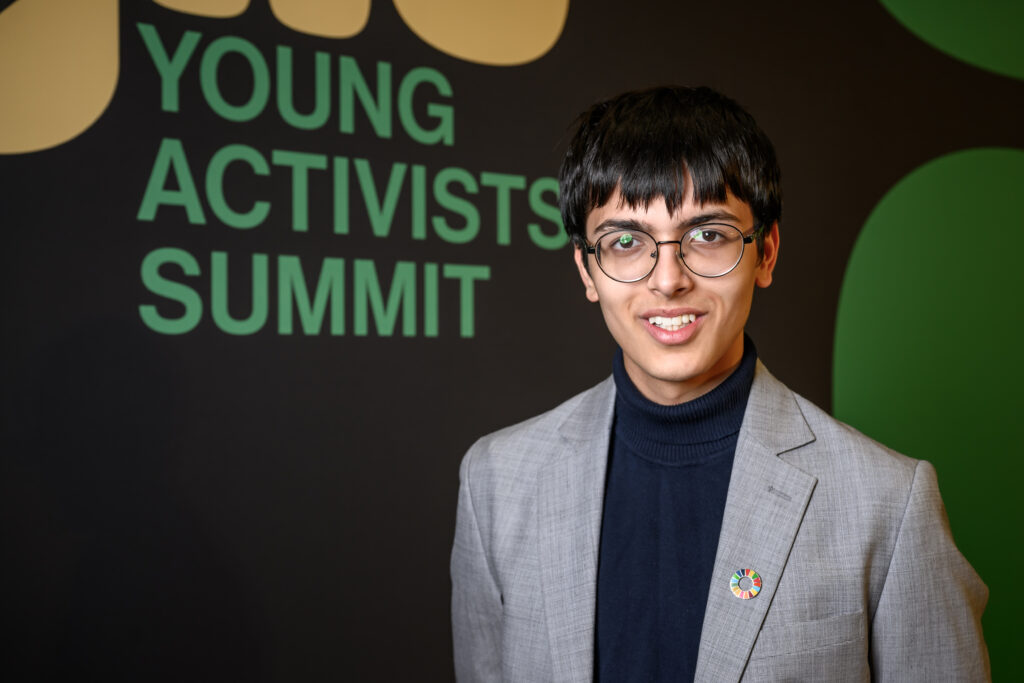Dev Karan recalls the first time he saw a purple pond, “filled with dyes and chemicals, and choked with plastic”.”It was heart-wrenching,” the 17-year-old from Haryana state in northern India told AFP in an interview.That sight during a school trip two years ago made him realise that “the climate crisis is happening everywhere”.He decided he had to act.Speaking on the sidelines of the annual Young Activists Summit (YAS) at the United Nations in Geneva, Karan described his path to becoming the youngest of five laureates at this year’s event.He won on Thursday for his efforts to restore India’s traditional ponds, which help prevent floods and soil erosion by storing water.Ponds are “often used by villages as a source of drinking water during droughts, help in carbon sequestration, nourish groundwater and they are biodiversity hotspots”, he said.- ‘Climate literacy’ -Yet there is far less attention on protecting and preserving these vital small water bodies than on oceans and rivers, he said.He and his friends noticed that even when huge investment goes into cleaning up ponds, they often slip back into decay after a few years due to lacking maintenance.Karan co-founded Pondora, an organisation that helps villages monitor their water quality using IT-based sensors and mobile tools.The team visits schools and teaches students how to use their kits, consisting of Bluetooth-connected monitors with sensors registering things like temperature, salinity and pH levels, as well as chemical strips to detect various compounds.They have trained an army of “Pond Ambassadors” to support local maintenance.”We focus on climate literacy and basically show them the importance of preserving such water bodies,” Karan said.”They now go around themselves and take the data from the ponds… (they are) going from being passive observers to activists.”YAS hailed Karan’s “replicable model for water ecosystem restoration — one pond at a time”.- ‘Your voice matters’ -The aspiring engineering student told AFP that exploring how digital technologies could simplify pond monitoring and using social media to spread the word had come naturally to him.”Growing up in a generation which had phones in their hands from a very long time, my thought process always goes to how we can use this as the medium,” he said.Karan said Pondora was currently seeking to create a database for all Indian ponds, pointing out that in New Delhi, half of those on paper had disappeared, with many covered up to make room for an expanding population.The goal is to raise awareness about the need to protect remaining ponds, including through a social media campaign urging people to post their photo with the one nearest them.Karan had one message for other young people: “Your voice matters.””Even if you contribute something which is small, it has ripple effects,” he said.”Everyone can be a leader. You just have to have the courage to start.”
Dev Karan recalls the first time he saw a purple pond, “filled with dyes and chemicals, and choked with plastic”.”It was heart-wrenching,” the 17-year-old from Haryana state in northern India told AFP in an interview.That sight during a school trip two years ago made him realise that “the climate crisis is happening everywhere”.He decided he had to act.Speaking on the sidelines of the annual Young Activists Summit (YAS) at the United Nations in Geneva, Karan described his path to becoming the youngest of five laureates at this year’s event.He won on Thursday for his efforts to restore India’s traditional ponds, which help prevent floods and soil erosion by storing water.Ponds are “often used by villages as a source of drinking water during droughts, help in carbon sequestration, nourish groundwater and they are biodiversity hotspots”, he said.- ‘Climate literacy’ -Yet there is far less attention on protecting and preserving these vital small water bodies than on oceans and rivers, he said.He and his friends noticed that even when huge investment goes into cleaning up ponds, they often slip back into decay after a few years due to lacking maintenance.Karan co-founded Pondora, an organisation that helps villages monitor their water quality using IT-based sensors and mobile tools.The team visits schools and teaches students how to use their kits, consisting of Bluetooth-connected monitors with sensors registering things like temperature, salinity and pH levels, as well as chemical strips to detect various compounds.They have trained an army of “Pond Ambassadors” to support local maintenance.”We focus on climate literacy and basically show them the importance of preserving such water bodies,” Karan said.”They now go around themselves and take the data from the ponds… (they are) going from being passive observers to activists.”YAS hailed Karan’s “replicable model for water ecosystem restoration — one pond at a time”.- ‘Your voice matters’ -The aspiring engineering student told AFP that exploring how digital technologies could simplify pond monitoring and using social media to spread the word had come naturally to him.”Growing up in a generation which had phones in their hands from a very long time, my thought process always goes to how we can use this as the medium,” he said.Karan said Pondora was currently seeking to create a database for all Indian ponds, pointing out that in New Delhi, half of those on paper had disappeared, with many covered up to make room for an expanding population.The goal is to raise awareness about the need to protect remaining ponds, including through a social media campaign urging people to post their photo with the one nearest them.Karan had one message for other young people: “Your voice matters.””Even if you contribute something which is small, it has ripple effects,” he said.”Everyone can be a leader. You just have to have the courage to start.”
